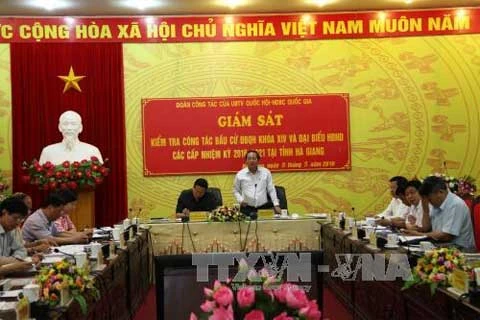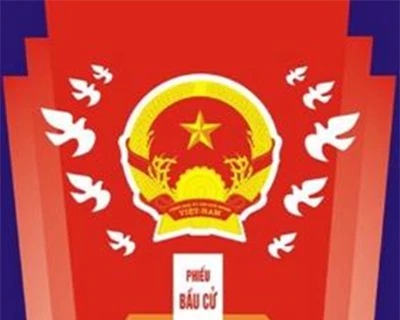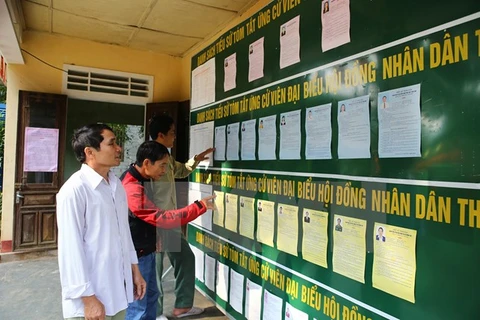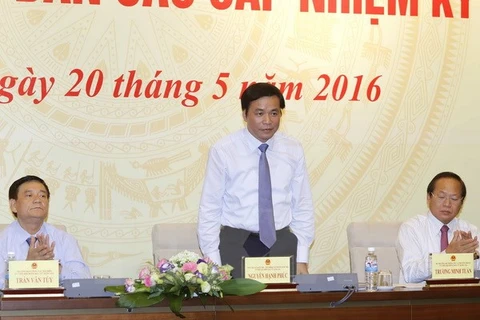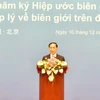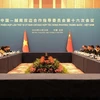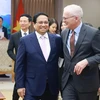Hanoi (VNA) – More than 69 million eligible Vietnamese voters are to choose deputies to the 14th National Assembly (NA) and all-level People’s Councils for 2016-2021 on May 22, a way to demonstrate their trust and responsibility towards the nation.
Voting is the best way for citizens to practice their right and obligation to build a socialist rule-of-law State of the people, by the people and for the people.
The first general election in Vietnam took place in January 1946, five months after the country gained independence. Bracing rabid sabotage of invasion and hostile forces, Vietnamese citizens from the age of 18, regardless of gender, ethnicity, religion and political viewpoints, participated in the first election by democratic, direct and secret ballot.
The first NA from 1946 to 1960 greatly contributed to consolidating independence, building a democratic republic state, and successfully waging the resistance war against foreign colonialists. It shored up the domestic economy, formed a regime of people’s democracy and promoted the northern region on the path to socialism, which provided a solid foundation for national reunification in the future.
From 1960 to 1975, the parliament from the second to fifth tenures enforced the Resolution of the third National Party Congress in 1960 and the 1959 Constitution. It made decisions on important policies that built socialism in the north and fought the invasive imperialists to completely liberate the south and reunify the nation in 1975.
From 1976, when the sixth NA – the first parliament of reunified Vietnam – was elected, to the current 13th NA, the parliament promulgated the Constitution in 1980, 1992 and 2013, along with hundreds of laws and ordinances. They created an important political and legal foundation for developing socialist democracy, building a socialist State of Vietnam ruled by law, ensuring human rights and citizens’ legitimate rights and interests.
The 14th general election on May 22 takes place amidst numerous complex developments in the region and the world that are directly affecting Vietnam and creating both opportunities and challenges. While globalisation and international integration are being promoted, the Southeast Asian nations have gathered in a community that has critical geographical, economic and political features. The region is also witnessing a strategic competition among some big countries, aside from fierce maritime territorial and sovereignty disputes.
Vietnam’s stature, strength and prestige in the international arena are increasing. However, there remain a number of risks, especially the risk of lagging behind in economic development; “peaceful evolution”; degradation of political thought, morals and lifestyles; “self-evolution” and “self-transformation” in some Party members, officials and public servants; together with bureaucracy, corruption and wastefulness.
Choosing the most deserving persons representing the people in the general election is an opportunity for citizens to form a new NA and all-level power agencies that are capable of successfully fulfilling the tasks assigned by the people amid the new domestic and global situation.
This year’s election is held after the issuance of the 2013 Constitution, which reiterates that the people are the masters of the country, and human rights are accompanied with citizens’ rights and obligations. Additionally, the 2015 Law on election of NA and People’s Council deputies includes many revisions facilitating citizens to exercise their rights and obligations.
Preparations for the elections have been made thoroughly with consultations, candidates’ meetings with voters, and electioneering. The straightforward dialogues have helped voters gain an insight into the candidates’ planned action programmes if they are elected. Thus, constituents can supervise the future deputies’ performance – the main way for voters to engage in building a State of the people, by the people and for the people.
Voters in some remote areas have already cast ballots. They are working offshore like residents in the Truong Sa island district of Khanh Hoa province and naval officers and soldiers. They also include ethnic minority people such as Mong, Ha Nhi and La Hu ethnics in mountainous Muong Te district of Lai Chau province.
The thorough preparations and the success of voting ahead of schedule in some places have proved that no plots or actions of any hostile forces can prevent the strength of the great national unity bloc, patriotism and citizens’ responsibility.
By casting ballots with patriotism, all constituents have the right to believe that they have elected the State power agencies representing their will and aspirations, which are firmly safeguarding the national sovereignty, weathering challenges and risks, expeditiously transforming Vietnam into a modern industrialised nation, and ensuring wealth and happiness for the Vietnamese people.-VNA

